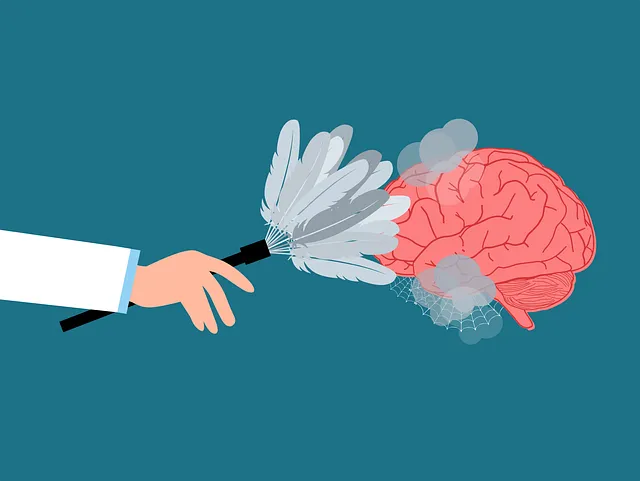Mental health policies, as evidenced by the Lafayette Kaiser Permanente mental health center reviews, are key to enhancing support systems and improving patient care. Community advocates can analyze existing frameworks to identify gaps and push for evidence-based improvements in access, affordability, and quality of mental healthcare. The Lafayette Kaiser Permanente centers excel in patient-centric care, focusing on empathy, holistic assessments, and effective communication. By examining KPIs like treatment outcomes, client satisfaction, and wait times, along with addressing data inconsistencies and staff training variations, policies can be crafted to improve programs and crisis interventions. Effective advocacy combines strategic planning with storytelling, using data and real-life narratives from centers like Lafayette Kaiser Permanente to showcase policy impacts. Integrating stress management, mental wellness journaling, and compassion cultivation strengthens advocacy cases and benefits both individuals and society. Engaging communities, policymakers, and healthcare providers fosters a culture of care, leading to more effective policy decisions.
Mental health policy analysis and advocacy are crucial components of creating a supportive societal landscape. This article delves into the intricate world of mental health governance, highlighting key players and strategies. We explore ‘Understanding Mental Health Policy’ as a foundational step for effective advocacy. A case study focusing on Lafayette Kaiser Permanente’s mental health center reviews underscores the impact of healthcare organizations in shaping policy. Furthermore, we analyze service evaluation metrics and discuss challenges, offering insights into successful policy advocacy strategies.
- Understanding Mental Health Policy: A Foundation for Advocacy
- The Role of Healthcare Organizations: Case Study – Lafayette Kaiser Permanente
- Analyzing and Evaluating Mental Health Services: Key Metrics and Challenges
- Strategies for Effective Mental Health Policy Advocacy
Understanding Mental Health Policy: A Foundation for Advocacy

Mental health policies are a cornerstone for advocating for better care and support systems. Understanding these policies is essential for anyone looking to make a difference in their community, especially considering the widespread impact of mental health issues. The Lafayette Kaiser Permanente mental health center reviews highlight the need for comprehensive policy frameworks that address access, affordability, and quality of care. By analyzing existing policies, advocates can identify gaps and weaknesses, ultimately pushing for improvements that reflect evidence-based practices and patient needs.
Policy advocacy is a strategic process that involves researching, proposing, and promoting changes in legislation or organizational directives. It requires a deep understanding of the current landscape, including trends in mental health care delivery, emerging research, and community needs. Incorporating self-care practices and stress reduction methods within these policies can mitigate burnout among mental health professionals while ensuring patients receive holistic support. This multi-faceted approach not only benefits individuals seeking treatment but also strengthens the overall resilience of communities.
The Role of Healthcare Organizations: Case Study – Lafayette Kaiser Permanente

Healthcare organizations play a pivotal role in shaping mental health policies and advocating for improved access to care. One outstanding example is Lafayette Kaiser Permanente, a renowned mental health center known for its innovative practices. The center’s approach emphasizes empathy-building strategies, ensuring patients feel understood and supported throughout their journey. By integrating these techniques into treatment plans, Lafayette Kaiser Permanente enhances the overall patient experience, fostering a sense of trust and encouraging open communication.
This mental health center also prioritizes confidence-boosting initiatives, which are essential for empowering individuals to take charge of their well-being. Through various programs, they teach patients coping mechanisms and resilience, enabling them to manage their mental health effectively. Furthermore, Lafayette Kaiser Permanente recognizes the importance of risk assessment for mental health professionals, implementing rigorous protocols to ensure the safety and well-being of both clients and practitioners. These strategies contribute to creating a supportive environment, reflecting the center’s commitment to excellence in mental healthcare delivery.
Analyzing and Evaluating Mental Health Services: Key Metrics and Challenges

Analyzing mental health services is a multifaceted process that involves evaluating various key metrics to assess quality and accessibility. At Lafayette Kaiser Permanente mental health centers, reviews highlight the importance of comprehensive assessments, evidence-based practices, and patient-centered care. Metrics such as treatment outcomes, client satisfaction, and wait times are crucial indicators of service effectiveness.
Challenges in this area include ensuring consistent data collection across different facilities and programs, addressing staff training disparities, and integrating feedback from diverse patient populations. Effective mental health policy analysis and advocacy require a deep understanding of these metrics and challenges, guiding the design of Mental Health Education Programs and Crisis Intervention Guidance to foster a more supportive and inclusive environment for all individuals seeking mental health services.
Strategies for Effective Mental Health Policy Advocacy

Effective mental health policy advocacy requires a multi-faceted approach that combines strategic planning with compelling storytelling. One key strategy involves leveraging data and real-life narratives from institutions like the Lafayette Kaiser Permanente mental health center reviews to illustrate the impact of current policies or the lack thereof. By presenting tangible examples of successful programs and their positive outcomes, advocates can build strong cases for policy changes.
Additionally, incorporating practices such as Stress Management, Mental Wellness Journaling Exercise Guidance, and Compassion Cultivation can enhance advocacy efforts. These techniques not only support individual well-being but also serve as powerful tools to demonstrate the broader societal benefits of improved mental health policies. Engaging communities, policymakers, and healthcare providers in these evidence-based approaches can foster a culture of care and understanding, ultimately driving more effective policy decisions.
Mental health policy advocacy is a multifaceted approach, as illustrated by the case study of Lafayette Kaiser Permanente’s innovative practices. By understanding the foundation of mental health policies and evaluating services through key metrics, we can identify challenges and develop effective strategies. Incorporating these insights, especially from successful centers like Lafayette Kaiser Permanente, will enhance mental health care accessibility and quality worldwide, as evidenced in various mental health center reviews. Through continued analysis and advocacy, we can foster a more inclusive and supportive society for those seeking mental well-being.






